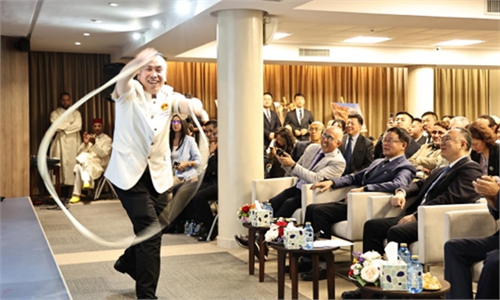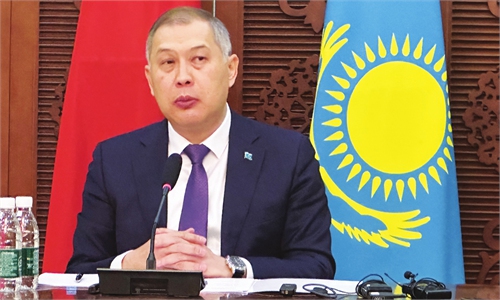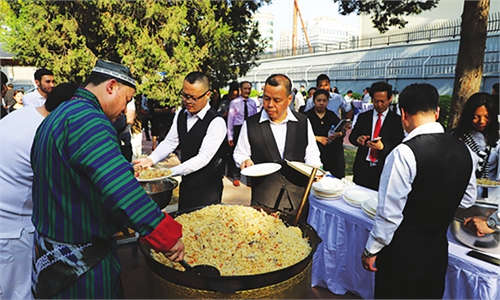ARTS / CULTURE & LEISURE
Concert fever continues to soar, but proper management still needed

People watch performance at a music festival in Arxan of Hinggan League, north China's Inner Mongolia Autonomous Region, Sept. 2, 2023. Arxan, located at the southwestern foot of the Dahinggan Mountains and at the intersection of four major grasslands, is an increasingly popular tourist destination. (Xinhua/Wang Kaiyan)
This spring and summer, many cities across China have enjoyed numerous heavyweight concerts, with pulsating notes composing urban melodies and adding fuel to a city's liveliness.According to the China Association of Performing Arts, there were 119,000 commercial performances held nationwide in the first quarter of 2024, a 72.71 percent year-on-year increase. Ticket revenue reached 10.8 billion yuan ($1.5 billion), up 116.87 percent year-on-year.
Meanwhile, nearly 200 large-scale concerts and music festivals with over 2,000 attendees each were held nationwide in the first quarter, and according to ticketing platform information, over 20 singers announced annual concert plans in China.
It is clear that large-scale events like concerts and music festivals have become a "delicious condiment" for people's holiday leisure and entertainment, especially among the young demographic. The revival of the offline performance market, accompanied by concerts, has not only brought about substantial ticket revenue but has also rapidly boosted urban cultural and tourism consumption, forming a new cultural and tourism consumption mode - concerts plus tourism.
So how have concerts driven local economies? Preliminary calculations suggest that singer Jay Chou's recent concert in Hangzhou, East China's Zhejing Province, directly drove cultural and tourism consumption by 1.316 billion yuan.
Many industry insiders say that the "concert plus tourism" consumption model has promising prospects. Concerts not only provide entertainment and artistic enjoyment but also drive the development of local tourism-related industries such as accommodation, catering, and transportation. This diversified consumption model benefits operators, internet platforms, and consumers alike.
From the popularity of concerts, we can see that people's enthusiasm for cultural consumption is stronger than ever, which is gratifying for the cultural industry. However, it also poses higher demands on those in the industry, who must deliver higher quality cultural products to captivate audiences. Some cities are doing a good job and showing their sincerity to audiences through innovative design and enthusiastic service.
For instance, singer Hua Chenyu held a three-day concert in Yantai, East China's Shandong Province, during the May Day holidays, not only attracting tens of thousands of spectators but also sparking heated discussions online with a so-called "sunrise concert" concept.
By moving the concert to a beach and adopting a theme park model instead of a traditional venue model, outdoor and immersive experiences lifted the event to a new level. Moreover, when the sun rose during the concert witnessed by all the audiences, it not only aligned with the concept of "rising with the sun" but also resonated with the coastal city of Yantai, providing a reference model for the market.
In addition, Jiang Peng, deputy mayor of Changzhou, East China's Jiangsu Province, appeared at the Phoenix Legend concert in Changzhou, where he shared his short video platform account, leading netizens to call him "easy-going." His Douyin account's comment section also became a "wishing well," where Jiang patiently responded to the comments left by netizens, becoming an internet business card for Changzhou.
Although the concert market is currently booming, with concerts happening almost every week in some major cities, news of "lip-syncing," inflated performances, poor viewing experiences, and chaotic event organization have repeatedly surfaced, undoubtedly serving as a wake-up call for the currently "overheated" concert market.
For example, Singaporean singer Mavis Hee held a solo concert at a stadium in Nanjing on April 20. She sang fewer than 10 songs, with some classic tracks performed by the band instead of her.
Another incident involving singer and former member of South Korean-Chinese boy band EXO Huang Zitao and Dutch DJ Martin Garrix at the F1 China Grand Prix music festival in Shanghai caused some misunderstandings. The organizers later apologized, citing miscommunication with the artists.
Concerts and music festivals are generally large outdoor events that require coordination among multiple departments, reflecting a city's level governance capabilities. Practitioners should constantly strive for perfection in their work and sincerely repay rather than "cheat" their audiences in order to maintain a healthy and sustainable concert industry.
The author is a reporter with the Global Times. life@globaltimes.com.cn




